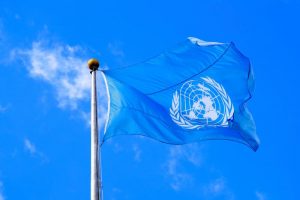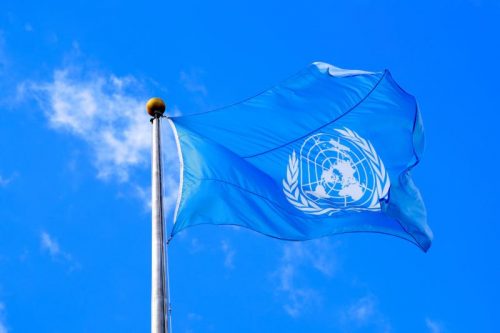RYE, N.Y. (CNS) — Faith-based organizations have worked with and alongside the United Nations since it was founded 75 years ago.
Given this history, faith groups and their leaders are uniquely suited to build on past cooperation to address current crises and future challenges, said presenters at a Sept. 8 online conference.
Speakers in a film shown at the event said faith-based organizations are at the forefront of grassroots efforts to provide food and shelter for all people, particularly in areas of conflict.
A shared earth requires a shared vision, they said. “Despite all appearances to the contrary, it is a moral universe,” said South African Archbishop Desmond Tutu, retired archbishop of Cape Town.

Faith-based organizations were instrumental in the development of seminal U.N. documents including the 1948 Universal Declaration on Human Rights, the 1989 Convention on the Rights of the Child and the 2015 Sustainable Development Goals.
Climate change, the threat of nuclear weapons, and escalating conflict and aggression offer current opportunities for faith-based organizations to work together with one another and the U.N., speakers said.
During the conference, Auxiliary Bishop James Massa of Brooklyn, New York, and rector of St. Joseph’s Seminary in Yonkers, New York, said respect for the resources of the planet is one of the greatest tasks for the human family.
He quoted Pope Francis’ prayer that the earth’s resources be shared in a just and respectful manner, not squandered. “We are squeezing out the planet’s goods; squeezing them out as if the earth were an orange,” he quoted.
Bishop Massa urged participants to “witness together to ecological justice and peace” and commit themselves “especially to our brothers and sisters in the global south whose natural resources are all too often exploited by countries and businesses based in the global north. Let us give our voice to the voiceless poor and the earth itself, which is our common home. No to plundering … and yes to sharing.”
The three-hour event drew 445 people on five continents for what was a spirited examination of the history, role and opportunities for faith-based organizations to advance the United Nations’ agenda in the areas of peace and security, sustainable development and human rights. It was organized by the Multi-Faith Advisory Council to the U.N. Interagency Task Force on Religion and Development.
Ambassador Sima Sami Bahous of Jordan said, “We need to remember that the United Nations is all of us, not an entity sitting outside of us, and includes U.N. members, civil society and faith-based organizations. We have a responsibility to make sure this multilateral body continues to serve effectively.”
Religious leaders are essential to ending conflict, she said, and can lay the groundwork for humanitarian aid and healthy communities and promote education and gender equality.
“It is in loving our neighbor, responding to our neighbor and sharing with our neighbor that we can create the world we want,” Bahous said.
Ambassador Christoph Heusgen of Germany said the U.N. “is challenged as never before” by among other things, COVID-19, climate change, xenophobia, nationalism and attacks on minority religious groups.
“Cooperation between governments is not sufficient to sow peace and resolve problems worldwide,” he said. Religions and civil society also must participate.
Some of the two dozen conference speakers acknowledged historical and contemporary fractures within and among religions. Archbishop Justin Welby of Canterbury, England, said if religious groups at the U.N. demonstrate they can disagree but still get along with one another, it will contribute to a vision of a peaceful world.
Joseph Donnelly, Caritas International’s permanent delegate to the United Nations, said nongovernmental and faith-based organizations are “windows to reality and windows to the world. We bring to the table the voices, hearts and hopes of people everywhere.”
Donnelly said the groups could help restore trust in the U.N. and expand its capacity to build a better world.
“We need a spiritual renaissance if we are to bring peace to the world,” he said.
Entertainer Marie Osmond said parents should help children understand God and see themselves as God’s literal children.
“We need to bring them back to houses of worship to find peace and safety. We need to guide them to quiet places to tune out distractions and tune into God’s voice,” she said. Doing so would eradicate many problems of hatred in the world, she said.
Speakers at the conference also discussed efforts to achieve gender equality, the challenge youth face with media and the internet, and the role of faith in the future of the U.N.






















